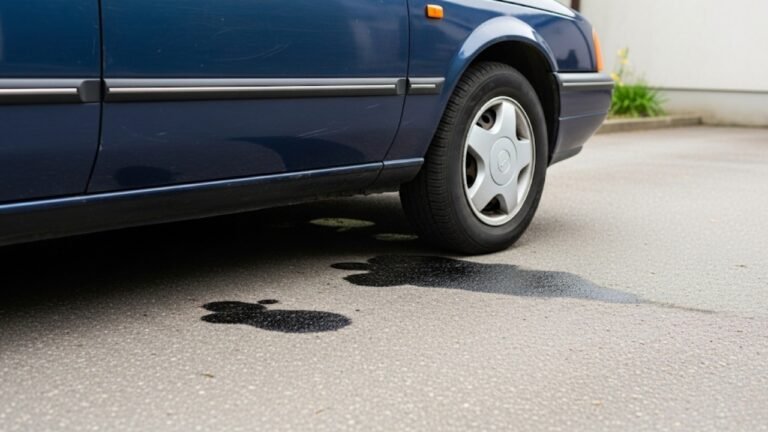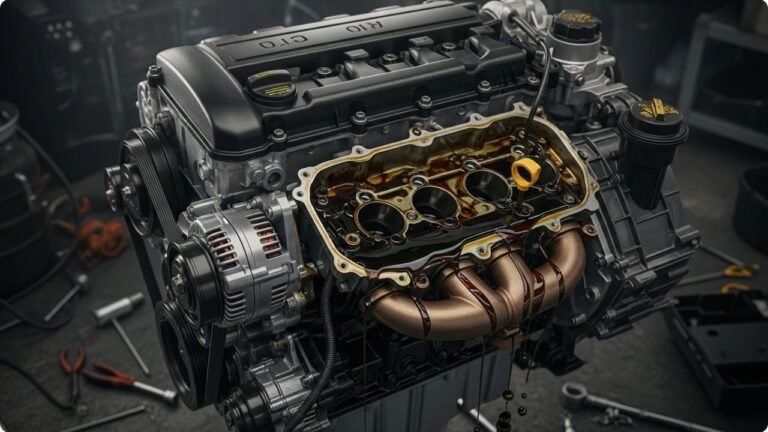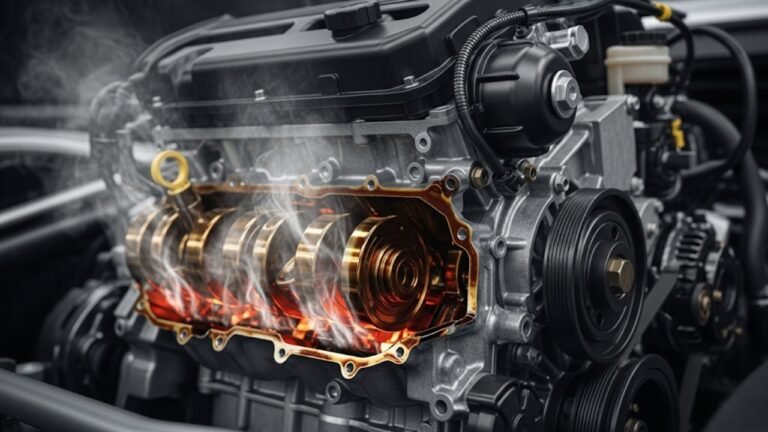Quaker State vs Supertech: My Honest Experience

When you drive across the United States, you quickly realize that no two regions treat your engine the same way. The heat in Arizona feels like it could fry an egg on your hood, while the icy mornings in the Midwest make your engine sound like it’s shivering. That’s why choosing the right motor oil isn’t just about brand names—it’s about how it feels behind the wheel. Over the past year, I tested two oils that many drivers talk about: Quaker State and Supertech. What started as a small experiment turned into a real-world lesson in performance, endurance, and value.
This is my story—my honest experience—comparing Quaker State vs Supertech. I’ve driven through dust storms, snowfalls, and bumper-to-bumper traffic. Both oils had their strengths, and both had moments that made me question my choice. So, let’s break down what I found.
Quaker State Oil Review – The Smooth Performer in All Seasons

When I first switched to Quaker State, I wasn’t expecting much. I’d been using other brands for years, but one summer, after back-to-back long drives through Arizona’s desert, I realized my old oil was losing its edge. My car started feeling heavy, like it was tired. That’s when a mechanic friend told me to give Quaker State Full Synthetic 5W-30 a try. I did—and the results were almost instant.
From the first start on a cold morning to long stretches on the interstate, my car felt smoother. The idle vibration softened, the acceleration got cleaner, and I noticed something subtle but real—my gas mileage ticked up a little. I’m not saying it turned my sedan into a hybrid miracle, but the difference was noticeable enough to make me smile at the pump.
Cold Weather Starts
One thing I loved was how confidently it handled freezing mornings. I remember one day in January when temperatures dropped below 20°F. Normally, my car would groan before waking up, but with Quaker State, the engine turned over smoothly on the first try. No hesitation, no struggle.
Highway Performance
On long drives—especially those 300–400-mile road trips—it was whisper-quiet. The engine hum was steady, and I didn’t feel that dry “strain” sound that cheaper oils sometimes leave after hours of running.
City Traffic Heat Test
Then came the summer test. Phoenix traffic at 2 PM under a 110°F sun is brutal on engines. My old oil used to make the temperature gauge twitch higher. Quaker State stayed cool, steady, and calm. The difference was like night and day.
Key Technical Details of Quaker State
I’m not an engineer, but I like knowing what’s under the hood. Quaker State comes in several viscosity grades—0W-20, 5W-30, and 10W-40—covering everything from hybrids to SUVs. I went with 5W-30 Full Synthetic because it’s a safe middle ground for most cars.
It meets API SN Plus, ILSAC GF-6, and Dexos standards, which basically means it’s been tested for wear protection, deposit control, and turbocharger safety. The additives in it—mainly detergents and friction modifiers—help keep the inside of the engine clean and reduce friction on moving parts.
One thing that stood out to me is the oil change interval. With Quaker State Full Synthetic, you can safely go up to 10,000 miles before changing it. For someone who drives long distances like I do, that’s a big deal. It saves both time and maintenance cost.
What I Liked About Quaker State
-
Excellent Engine Protection: My engine stayed clean, and I noticed less buildup when I checked the dipstick.
-
Quiet and Smooth Running: It genuinely reduced noise during idling and acceleration.
-
Stable in Extreme Weather: Whether it was below freezing or blazing hot, it performed consistently.
-
Extended Oil Life: The 10,000-mile interval was a huge plus.
-
Improved Fuel Efficiency: My mileage improved slightly on highway drives.
What Could Be Better
No product is perfect, and Quaker State has its downsides too. The price is higher compared to store brands like Supertech. You’re paying a premium for quality, but if you’re on a budget, that might sting.
Also, for older, high-mileage vehicles, Quaker State’s thin synthetic formula might not be the best choice. Older engines often prefer thicker oils to maintain pressure and minimize leaks. Finally, while it’s available in most major stores, smaller auto shops sometimes don’t carry every grade, which can be inconvenient.
Who Should Buy Quaker State Oil
If you drive long distances, travel through extreme weather, or just want fewer oil changes, this one’s for you. It’s also great for modern engines, especially turbocharged or hybrid vehicles that need high thermal stability.
Basically, Quaker State is ideal for anyone who treats their car like an investment rather than just transportation.
Who Should Look Elsewhere
If you’re on a tight budget, have a high-mileage vehicle, or don’t drive much, you might not see the full benefit of spending more. In those cases, a mid-range or budget synthetic oil could be enough.
Final Thoughts on Quaker State (Before the Comparison)
Switching to Quaker State gave my car a second wind. It felt cleaner, quieter, and more confident on both highways and city roads. I won’t claim it made a night-and-day transformation, but the little things added up. My engine temperature stayed consistent, fuel economy improved slightly, and the ride just felt better.
If I had to describe it in one word, I’d say refined. Quaker State feels like that friend who doesn’t talk too much but always shows up when you need them. Reliable, consistent, and quietly impressive.
Supertech Oil Review – The Budget Hero That Surprised Me

When people talk about Supertech, it’s often with mixed opinions. Some dismiss it as a “cheap Walmart brand,” while others swear by its performance. I used to fall into the first camp—until I actually tried it.
After months of using Quaker State, I decided to run an experiment. I drained my engine and filled it with Supertech Full Synthetic 5W-30, just to see if it could keep up. The timing couldn’t have been better—it was winter in the Midwest, with temperatures swinging between freezing nights and windy afternoons.
Cold Morning Test
I expected rough starts, maybe sluggish crank times, but the first morning surprised me. My car started almost as easily as it did with Quaker State. The idle was steady, and there was no metallic knocking that some low-grade oils cause in cold weather. That was a good start.
Long-Distance Drive
A week later, I drove from Chicago to Kansas City—a 500-mile stretch of mixed highways and rolling hills. Supertech held its own. The engine stayed quiet, oil temperature stayed normal, and I didn’t feel any loss of power. In fact, gas mileage was about the same as what I’d seen with Quaker State.
Stop-and-Go Traffic
But where Supertech really impressed me was in city traffic. In stop-and-go driving, the oil seemed to manage heat effectively. No noticeable drop in performance, no engine lag.
Technical Details of Supertech
Supertech may be budget-friendly, but it’s not low-quality. It’s available in 0W-20, 5W-30, and 10W-40, just like Quaker State. It also meets the latest API SN Plus, ILSAC GF-6, and Dexos certifications, which means it passes modern industry standards.
The additives inside are similar too—detergents to fight sludge, anti-wear agents for durability, and friction modifiers for smoother operation. The main difference is the oil change interval. Supertech is rated for about 6,000 miles between changes, which is shorter than Quaker State’s 10,000 but still solid for its price.
What I Liked About Supertech
-
Affordable Yet Effective: It performs like a mid-range synthetic but costs less.
-
Reliable in Harsh Weather: Worked well in freezing cold and moderate heat.
-
Smooth Engine Response: Acceleration and idling felt stable.
-
Good for Everyday Driving: Perfect for city commuters or short trips.
-
Meets All Major Certifications: You get quality assurance despite the low price.
What Could Be Better
Supertech isn’t a premium oil, and that shows in a few areas. It doesn’t last as long as Quaker State, so you’ll be changing it more often. For high-performance or turbocharged engines, it might not deliver the same long-term protection.
Also, while it’s widely available at Walmart, certain viscosity grades are sometimes out of stock or sold in limited quantities. And though it works fine with regular filters, I found that pairing it with a premium oil filter improves performance noticeably.
Who Should Buy Supertech Oil
If you’re someone who drives regularly but doesn’t push your car to extremes, Supertech makes perfect sense. It’s reliable, easy on the wallet, and does the job well enough for everyday use. It’s also great for those who like to stay on top of maintenance but don’t want to spend extra on branded oils every few months.
In short: if Quaker State is like a tailored suit, Supertech is your favorite pair of jeans—comfortable, dependable, and surprisingly durable.
Quaker State vs Supertech: Detailed Comparison
Now that I’ve spent months using both, let’s get down to the real question—which one is better? I’ll say this upfront: both Quaker State and Supertech perform impressively for their respective price points. But their differences become clear when you look closely at how they behave under pressure, temperature, and time.
To make it easier, I’ve broken down their performance in key categories based on my real-world experience and some research-backed insights.
1. Viscosity and Flow Performance
Viscosity is just a fancy way of saying how “thick” or “thin” the oil is. It determines how easily the oil moves through the engine, especially during startup or when the engine is extremely hot.
In winter, Quaker State feels smoother. It flows quickly, coating engine parts faster during cold starts. My sedan, which used to rattle a little on freezing mornings, felt smoother and quieter.
In contrast, Supertech seemed slightly thicker at startup. It wasn’t bad, just not as “effortless.” But here’s where Supertech wins—high-temperature stability. During summer drives in Kansas, it held its viscosity better in extreme heat.
| Aspect | Quaker State | Supertech |
|---|---|---|
| Cold Start Flow | Excellent | Good |
| High-Temp Stability | Good | Excellent |
| Viscosity Options | Wide range | Moderate range |
| Overall Rating | 9/10 | 8/10 |
Verdict: Quaker State for cold starts, Supertech for hot weather endurance.
2. Oil Types and Availability
Both brands cover all major bases—conventional, synthetic blend, and full synthetic. However, Quaker State stands out because it offers a semi-synthetic line that bridges the gap between conventional and full synthetic oils. This is great for those who want better protection without paying premium prices.
Supertech focuses on full synthetic and conventional types, but its selection is simpler—fewer SKUs, fewer options.
| Oil Type | Quaker State | Supertech |
|---|---|---|
| Full Synthetic | Yes | Yes |
| Semi-Synthetic | Yes | No |
| Conventional | Yes | Yes |
| Availability | Moderate (some stores lack stock) | Excellent (available at Walmart) |
| Rating | 9/10 | 8/10 |
Verdict: Quaker State wins for versatility, Supertech wins for convenience.
3. Additive Quality and Engine Cleanliness
This is where Quaker State earns its reputation. Its advanced additive system includes detergents, friction modifiers, and anti-wear agents that help keep the engine clean and reduce internal friction.
When I checked my dipstick after about 6,000 miles with Quaker State, the oil was darker but not sludge-thick. With Supertech, at a similar mileage, it looked more worn out. That doesn’t mean Supertech is bad—it just shows that Quaker State’s additives are more robust.
| Additive Type | Quaker State | Supertech |
|---|---|---|
| Detergents | Strong | Moderate |
| Anti-Wear Agents | Strong | Strong |
| Friction Modifiers | Excellent | Good |
| Sludge Prevention | Very Good | Average |
| Rating | 9/10 | 8/10 |
Verdict: For cleaner engines and long-term reliability, Quaker State has the upper hand.
4. Engine Protection and Durability
Over time, your engine oil’s job is simple—protect the metal parts from grinding against each other. Quaker State delivers impressive long-term wear protection. After 8,000 miles, my car still idled quietly and accelerated smoothly.
Supertech protected well too, but around the 5,500–6,000-mile mark, I started to notice a slightly rougher idle, suggesting it was nearing the end of its effective life.
| Protection Factor | Quaker State | Supertech |
|---|---|---|
| Wear Prevention | Excellent | Good |
| Sludge Control | Strong | Moderate |
| Oil Longevity | 10,000 miles | 6,000 miles |
| Rating | 9/10 | 7/10 |
Verdict: Quaker State wins clearly here—longer-lasting and better under strain.
5. Fuel Efficiency and Mileage Impact
Let’s be honest: engine oil won’t turn your car into a fuel-sipping hybrid. But it can reduce friction enough to add a little improvement—especially on highways.
With Quaker State, I noticed a 3–4% increase in highway mileage. Supertech also improved mileage, but it wasn’t as consistent. On city roads, both performed about the same, but on longer drives, Quaker State gave smoother throttle response and slightly better fuel economy.
| Factor | Quaker State | Supertech |
|---|---|---|
| MPG Improvement | Good | Good |
| Engine Smoothness | Excellent | Good |
| High-Mileage Compatibility | Good | Moderate |
| Rating | 8.5/10 | 8/10 |
Verdict: Quaker State edges ahead with smoother power delivery and consistent mileage gains.
6. Temperature Performance
If you live in a region where temperatures swing between extremes, this section matters most. Quaker State handles cold better, while Supertech holds up better in heat.
I noticed Quaker State’s low-temperature viscosity keeps flow steady, helping during early-morning starts in snowy areas. But when temperatures soared over 100°F, Supertech’s oil didn’t thin out as quickly, giving better stability in sustained heat.
| Condition | Quaker State | Supertech |
|---|---|---|
| Cold Start | Excellent | Good |
| High Heat | Good | Excellent |
| Extreme Conditions | Very Strong | Good |
| Rating | 9/10 | 8/10 |
Verdict: For northern drivers, Quaker State is ideal. For southern heat, Supertech delivers.
7. Longevity and Oil Change Interval
This was one of the biggest deciding factors for me. Changing oil isn’t just a cost—it’s time, effort, and sometimes a full afternoon gone.
Quaker State’s Full Synthetic easily lasts up to 10,000 miles under normal conditions. I even stretched it to about 10,500 once, and the oil still held up decently. Supertech, on the other hand, is rated for about 6,000 miles. After that, you’ll start to notice performance drop-offs.
| Longevity Factor | Quaker State | Supertech |
|---|---|---|
| Recommended Change | 10,000 miles | 6,000 miles |
| Extended Drain Options | Yes | No |
| High-Mileage Use | Strong | Moderate |
| Rating | 9/10 | 7/10 |
Verdict: Quaker State offers longer-lasting performance and better value for long-term drivers.
8. Price Comparison
Here’s where Supertech finally wins. It’s one of the most affordable full synthetics on the market. You can grab a 5-quart jug at Walmart for a fraction of the price of most premium brands. Quaker State, while not as expensive as Mobil 1 or Castrol Edge, still costs noticeably more than Supertech.
If you’re maintaining multiple vehicles or just want something budget-friendly that works well, Supertech will save you real money over time.
| Brand | Average Price per 5 Quarts | Change Interval |
|---|---|---|
| Quaker State | $25–35 | 10,000 miles |
| Supertech | $18–25 | 6,000 miles |
Verdict: Supertech for affordability, Quaker State for long-term value.
Final Recommendation: Quaker State vs Supertech
After using both for over a year, I’d say this:
-
Quaker State is for those who value refinement, longevity, and consistency. If you often drive long distances or face harsh climates, it’s worth the higher cost. It’s also great for newer engines and anyone who hates frequent oil changes.
-
Supertech is for budget-conscious drivers who still want solid, reliable protection. It’s perfect for city commutes, short-distance driving, or backup vehicles that don’t rack up miles quickly.
If you drive in extreme weather or want smoother, longer-lasting protection, go with Quaker State.
If you’re trying to save money and need something dependable for everyday driving, Supertech is an excellent deal.
FAQs: Quaker State vs Supertech
1. Which oil lasts longer—Quaker State or Supertech?
Quaker State lasts longer, up to 10,000 miles, compared to Supertech’s 6,000-mile interval.
2. Is Supertech good for modern engines?
Yes, it meets modern standards like API SN Plus and ILSAC GF-6, so it’s fine for most modern cars, though not ideal for performance vehicles.
3. Which oil handles extreme weather better?
Quaker State performs better in cold conditions, while Supertech is stronger in hot, dry climates.
4. Does Quaker State improve fuel economy?
Slightly, yes. It helps reduce engine drag, leading to smoother performance and better gas mileage on highways.
5. Is Supertech a good value for money?
Absolutely. It’s one of the best-performing budget oils available and provides solid reliability for everyday driving.
6. Can I switch between Quaker State and Supertech?
Yes, as long as you match viscosity (like 5W-30 to 5W-30). Just make sure to do a complete oil change, not a top-up mix.
Final Verdict
At the end of the day, choosing between Quaker State and Supertech comes down to what you value more—performance or price.
Quaker State gives you the feel of a smoother, more refined drive, longer intervals between changes, and better protection in demanding conditions. Supertech, meanwhile, offers 80% of that performance at nearly half the price.
For me personally, after driving through Arizona’s blistering heat and Midwest’s icy winters, I’d say this:
If you want peace of mind and don’t mind paying a little extra, go with Quaker State.
But if you’re practical and prefer saving money without sacrificing reliability, Supertech won’t disappoint.
Both oils earned my respect—but for long hauls and harsh weather, Quaker State became my go-to. For quick maintenance and budget-conscious choices, Supertech will always have a place in my garage.






